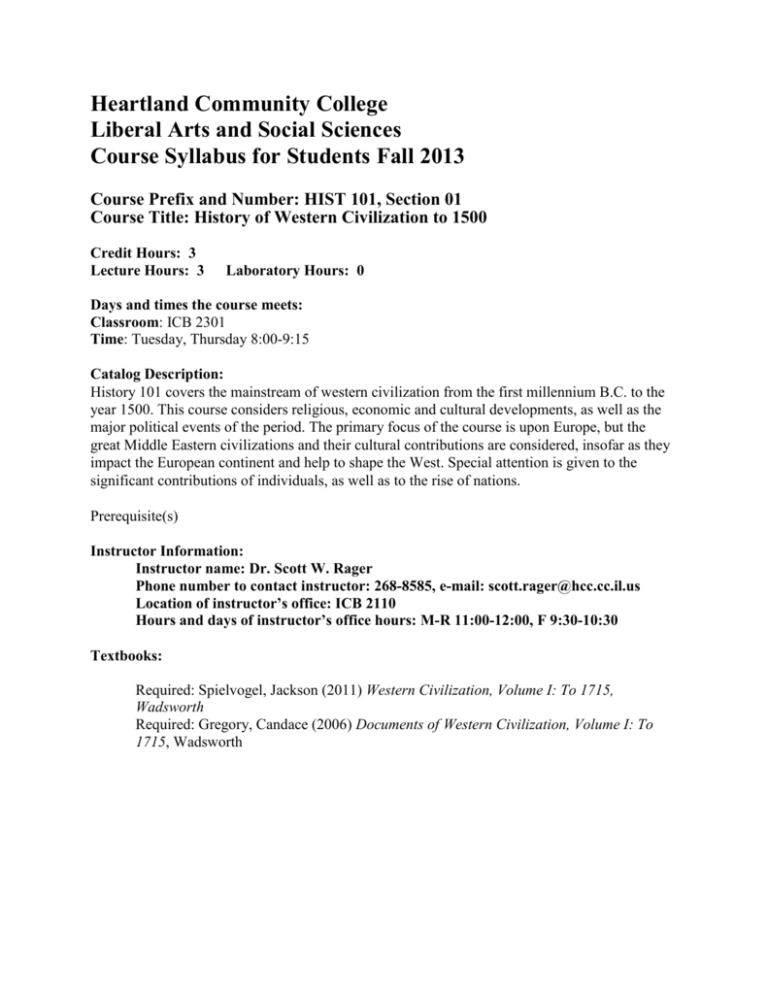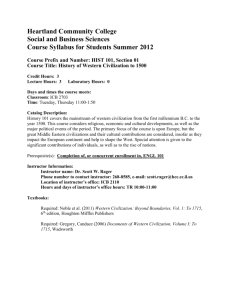HIST 101 01 RAGER FA 13 - Heartland Community College
advertisement

Heartland Community College Liberal Arts and Social Sciences Course Syllabus for Students Fall 2013 Course Prefix and Number: HIST 101, Section 01 Course Title: History of Western Civilization to 1500 Credit Hours: 3 Lecture Hours: 3 Laboratory Hours: 0 Days and times the course meets: Classroom: ICB 2301 Time: Tuesday, Thursday 8:00-9:15 Catalog Description: History 101 covers the mainstream of western civilization from the first millennium B.C. to the year 1500. This course considers religious, economic and cultural developments, as well as the major political events of the period. The primary focus of the course is upon Europe, but the great Middle Eastern civilizations and their cultural contributions are considered, insofar as they impact the European continent and help to shape the West. Special attention is given to the significant contributions of individuals, as well as to the rise of nations. Prerequisite(s) Instructor Information: Instructor name: Dr. Scott W. Rager Phone number to contact instructor: 268-8585, e-mail: scott.rager@hcc.cc.il.us Location of instructor’s office: ICB 2110 Hours and days of instructor’s office hours: M-R 11:00-12:00, F 9:30-10:30 Textbooks: Required: Spielvogel, Jackson (2011) Western Civilization, Volume I: To 1715, Wadsworth Required: Gregory, Candace (2006) Documents of Western Civilization, Volume I: To 1715, Wadsworth Relationship to Academic Development Programs and Transfer: This course fulfills 3 of the 9 semester hours of credit in Social Sciences required for the A.A. or A.S. degree. This course should transfer as part of the General Education Core Curriculum described in the Illinois Articulation Initiative to other Illinois colleges and universities participating in the IAI. However, students should consult an academic advisor for transfer information regarding particular institutions. Refer to the IAI web page at www.itransfer.org for more information. COURSE OBJECTIVES (Learning Outcomes): Outcomes General Education Range of Assessment Outcomes Methods Distinguish between primary and secondary sources as the foundation of modern historical scholarship from the first millennium B.C. to 1500. PS1 exams, quizzes, research paper, group project, other methods Interpret primary sources critically by analyzing their historical contexts. CT3 exams, quizzes, research paper, group project, other methods Formulate historical interpretations, both CO4 in discussion and in writing, and defend them critically with reference to primary and secondary sources. exams, quizzes, research paper, group project, oral report, other methods Incorporate into historical interpretations, CT3 both in discussion and in writing, an understanding of historical causation reflecting a) knowledge of important figures and events and their chronological relationship to each other and b) an awareness of the contingent relationships. Acquire at one and the same time a DI3 comprehension of diverse cultures and shared humanity, as evidenced both orally and in writing. exams, quizzes, research paper, group project, oral report, other methods exams, quizzes, research paper, group project, oral report, other methods Topic Outline for the Course: The Civilization of the Ancient Near East Hellenic Civilization The Roman World The Byzantine Recovery and the Challenge of Islam Charlemagne and the Carolingian Empire The High Middle Ages The Crusades The Late Middle Ages The Renaissance Course Policies: Method of Evaluation (Tests/Exams, Grading System): 1 midterm exam, 100 points 1 final exam, 150 points 2 quizzes, 50 points each (100 points total) 2 class discussion essays, 2-4 pages - 50 points each (100 points total) 5 document analysis exercises, 20 points each (100 points total) research topic proposal, 1 page - 25 points research status report, 3-4 pages - 50 points 1 research paper, 8-10 pages, 150 points 775 points total: 90% 775-698 =A 80% 697-620 =B 70% 619-542 =C 60% 541-465 =D Below 60% =F Attendance: Students are expected to attend all classes and participate meaningfully in the activities of each class session. Attendance will be taken at every class meeting. All students are allowed three unexcused absences. Additional absences may be excused at the discretion of the instructor with proper documentation. College sanctioned activities are excused absences. More than three unexcused absences will result in a penalty of a loss of 5% of the total possible points in the class. Note: Because starting class on time is extremely important, 10 minutes late arrival to class 3 times will count as an unexcused absence. Also, such actions as sleeping, gaming, or texting are unacceptable during class time and will count as an unexcused absence. Withdrawal from the Course: Students who have not completed at least 80% of the assignments within the first eight weeks of class will be withdrawn by the instructor at midterm. Incompletes: Under extra-ordinary circumstances an incomplete may be given at the instructor’s discretion. No one has an automatic right to receive an incomplete. Extra-Credit: No extra credit options are available. Make-up of Tests and Assignments: All make-ups are granted at the discretion of the instructor and will be determined according to the individual merits of the case. Students are required to contact the instructor by email or by phone within 24 hours after a quiz or an exam is missed to make arrangements for a make-up at the testing center. Deadlines: Assignments received late will not receive full credit. In order to pass this class, students must complete every assignment. Please note: Everyone must submit a research paper on Thursday, November 7. Late papers will be significantly penalized. This course requires approximately 30-40 pages of reading per class session or 500 per semester. Reading assignments will include both primary and secondary source materials. A minimum of 15 pages of college level writing is required in this course. Writing assignments include papers of various lengths, essay exams and various projects as deemed appropriate by the instructor. Student Conduct: Inappropriate behavior in the classroom will not be tolerated by the instructor. At all times students should endeavor to conduct themselves in an honest and mature manner. Cell phones should be turned off upon entering class. Please also note that no food or beverages with the exception of water are allowed in the classroom. HCC Portal Just a reminder that to access IRIS and your Heartland Student Email, you will need to log into myHeartland, at https://my.heartland.edu. Course Calendar Notice of Cancelled Class Sessions: Cancelled class sessions, for all HCC classes, will be listed under Cancelled Class Meetings in the A-Z Index and under Academic Information in the Current Students page on the HCC Web site. Go to http://www.heartland.edu/classCancellations/ to learn what classes have been cancelled for that day and the upcoming week. Be sure to check the last column, which might contain a message from the instructor. Syllabi Disclaimer: Changes to the Course Calendar may be made during the course of the class. This is sometimes unavoidable and students will be notified in class should changes become necessary Weeks 1 and 2 Topic: The Civilization of the Ancient Near East Reading: Chapters 1 & 2 8/20, 22 Class introduction, Prehistoric Era and Mesopotamian Civilization 8/27, 29 Mesopotamia (cont.) Egyptians, Hebrews, Assyrians, & Persians Document Analysis 1 Homework due 8/29: Gregory, pp.7-9, questions 1-3 p.7. Weeks 3 and 4 Topic: Hellenic Civilization Reading: Chapters 3 & 4 9/3, 5* Ancient Greece (Research Paper Topics Due*) 9/10, 12 Classical Greece Document Analysis 2 Homework due 9/10: Gregory, pp. 28-31, questions1-3 p.28. Weeks 5 & 6 Topic: The Roman World Quiz over Chapters 1-4 Reading: Chapter 5 9/17, 19 Ancient and Republican Rome Document Analysis 3 Homework due 9/17: Gregory pp. 69-74, questions 1-3 p. 69. 9/24, 26* Republican Rome (Research Paper Status Report Due*) Student Meetings with Instructor Weeks 7 & 8 Topic: The Roman World (continued) Reading: Chapter 6 and 7 10/1, 3 Imperial Rome Student Meetings with Instructor 10/8, 10*The Early Christian Church, Midterm Exam* Student Meetings with Instructor Weeks 9 & 10 Topics: The Byzantine Recovery and the Challenge of Islam; Charlemagne and the Carolingian Empire Reading: Chapters 7 and 8 10/15, 17 The Byzantine Empire (Discussion 1 on Greek and Roman contributions) 10/22, 24* The Nation of Islam & the Early Middle Ages (discussion essay on Greeks and Romans due 10/24) *Draft of Research Paper due to Writing Lab. Appointment must be completed no later than Oct 25. Weeks 11 & 12 Topics: The High Middle Ages; the Crusades Reading: Chapter 9 & 10 10/29, 10/31 The High Middle Ages (pt. 1) and the Crusades 11/5, 7*The High Middle Ages pt. 2 Document Analysis 4 Homework due 10/31: Gregory pp.124-127, questions 1-3 p.124. RESEARCH PAPER DUE 11/7! Weeks 13 & 14 Topics: the Late Middle Ages Quiz over Chapters 7-10 Reading: Chapter 11 11/12, 14 the Late Middle Ages pt. 1 11/19, 21 Late Middle Ages pt.2 Document Analysis 5 Homework due 11/12: Gregory pp.149-156, questions 1-3 p.150. Weeks 15 &16 Topic: the Renaissance Reading: Chapter 12 11/26, the Renaissance 12/3, 5 Semester Wrap-up (Discussion 2 on the value of the Middle Ages) Week 17 Exam Week Final Exam 8:00-9:50 Tuesday December 10 (class discussion 2 on the value of Middle Ages due, no late papers will be accepted)






